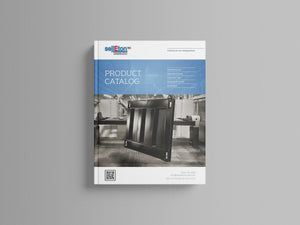
Top HACCP Scales for Ensuring Food Safety Compliance
HACCP scales are crucial for food safety compliance. They monitor critical points where contamination could happen in food production. In this article, we’ll cover how HACCP scales work, their key features, and the types available.
Key Takeaways
-
Implementing HACCP is essential for managing food safety from production to consumption, requiring management commitment and personnel training.
-
HACCP-compliant scales, including checkweighers, multi-head weighers, and bench scales, are designed to ensure accurate measurements, reduce contamination, and meet food safety standards.
-
Regular calibration of weighing equipment is crucial for maintaining HACCP compliance, as it prevents measurement errors and supports traceability during inspections and audits.
Understanding HACCP Compliance in Food Weighing
Implementing HACCP ensures that food safety is proactively managed from production to consumption, preventing issues before they arise. This system is designed to identify and control critical points in food processing that could lead to safety hazards, making it an essential part of any food manufacturing operation. Each HACCP plan is tailored to the specific processes and products of a food establishment to effectively control identified hazards. This customization ensures that all potential risks are addressed in a manner that suits the unique needs of the business.
Management commitment is crucial for effective HACCP implementation, as it fosters a culture of food safety within the organization. When management actively supports and participates in food safety initiatives, it sets a standard for the entire team to follow. This commitment is also vital for meeting regulatory approvals and inspections, which often require HACCP compliance.
Training personnel in HACCP principles is another critical introduction theory aspects, ensuring that everyone involved in the food production process understands their role in maintaining safety standards.
HACCP-compliant scales play a vital role in this process. These scales must be manufactured using materials that are safe for food contact and designed to prevent contamination. Appropriate weighing equipment helps food manufacturers meet safety regulations and quality standards, safeguarding consumers and their brand’s reputation.
Key Features of HACCP-Compliant Scales
The features of weighing equipment critically impact food safety. HACCP-compliant scales feature sanitary designs for easy cleaning and maintenance, preventing contamination. The design minimizes areas where dirt can accumulate, promoting easier cleaning and hygiene. Maintaining a clean and sanitary workspace is crucial in food manufacturing environments.
These scales also feature advanced technologies that provide precise weight measurements, accommodating a variety of food products:
-
Suitable for solid ingredients, liquids, or a combination of both
-
Provide accurate measurements essential for maintaining consistency and quality
-
HACCP-compliant with functions for quick and accurate calibration
-
Ensure reliability and compliance with food safety standards
HACCP-compliant scales also need to meet stringent quality standards. They are designed to be robust and durable, capable of withstanding the demands of a busy food production environment. Investing in high-quality scales ensures consistent and reliable results, supporting overall food safety strategies.
Types of HACCP Scales for Food Safety
The types of HACCP scales available for food safety are as diverse as the food industry itself. These include:
-
Checkweighers
-
Multi-head weighers
-
Conveyor belt scales
-
Combination x-ray machines
There is a wide range of options to meet specific food industry needs. Each type of scale serves a unique purpose, ensuring that food products are weighed accurately and consistently throughout the production process.
Checkweighers are used in various food applications to ensure that products meet weight specifications, preventing underweight or overweight packages from reaching consumers. Multihead weighers weigh, on the other hand, are particularly effective in accurately packaging food at correct weights, making them ideal for high-speed production lines.
These specialized food scales are essential for maintaining food safety and compliance, offering reliable and precise measurements.
Bench Scales
Bench scales are designed to provide accurate measurements for portions in food preparation and processing. These versatile scales can be installed beneath conveyor belts, optimizing space and workflow in busy production environments. This makes them ideal for portion control, ensuring each product meets specifications.
Liquids and solids require different weighing systems, with light and heavy items needing different calibrations. Bench scales can be calibrated to meet these specific requirements, providing precise measurements that are essential for maintaining product consistency and quality in glass.
Their versatility and accuracy make them invaluable in any food manufacturing operation, highlighting the influence and advantages of these methods they operate through research on sugar and yeast that are utilized.
Platform Scales
Platform scales are ideal for weighing larger food items and can handle significant weights, making them perfect for bulk processing. Key features and uses include:
-
Designed to accommodate large quantities of food items
-
Ensure even the heaviest products can be weighed accurately and efficiently
-
Crucial in industries like meat processing, where large cuts of meat need accurate weighing and portioning
The robust design of platform scales ensures that they can withstand the demands of a busy production environment. Built to be durable and reliable, they provide consistent and accurate measurements essential for food safety and compliance. Using platform scales ensures products meet weight specifications and quality standards.
Digital Scales
Digital scales represent the fundamental form of weighing in food manufacturing, offering precise measurements that are essential for maintaining product consistency and quality. These scales often feature tare weight, auto shut-off, and various units of measure, enhancing versatility and ease of use. The Salter range, for example, includes both mechanical and digital scales, appealing to diverse user preferences.
Digital scales are particularly well-suited for weighing liquids, pet treats, and dry ingredients. Their accuracy and ease of use make them indispensable in any food manufacturing operation. Whether measuring small quantities of spices or large batches of liquid ingredients, a kitchen scale provides the precision needed to maintain product quality and consistency.
The Role of Calibration in Maintaining HACCP Compliance
Regular calibration minimizes the risk of measurement errors that could lead to non-compliance. Calibration ensures accurate measurements, essential for maintaining food safety standards. The frequency of calibration should be based on the scale’s usage, environment, and manufacturer guidelines. Following these guidelines ensures weighing equipment remains reliable and accurate.
Calibration helps maintain measurement traceability, vital for HACCP documentation. Accurate calibration and maintenance records provide compliance evidence during inspections and audits.
Selleton Scales emphasizes the importance of regular calibration to prevent deviations that can affect food safety, offering customized solutions to meet the specific focus needs of each business.
Benefits of Using HACCP Scales in Food Manufacturing
Incorporating HACCP practices decreases waste and recalls, benefiting both businesses and consumers. Implement HACCP-compliant scales reduced Salmonella contamination in poultry, showing a direct link to improved food safety outcomes. This protects consumers while enhancing brand reputation and customer loyalty.
HACCP-compliant scales improve traceability and accountability in the supply chain. A seafood distributor adopting these scales saw better compliance during inspections and improved operational traceability. Company certification rates improved significantly after introducing HACCP scales, jumping from 34.2% to 59.6%. This demonstrates the positive impact that these scales can have on food safety management.
Training and resource availability for food safety management increased substantially after implementing HACCP scales, with 80% of companies reporting improvement. Integrating systems like crisis management and food defense expanded significantly, further enhancing food safety protocols. These benefits highlight the critical role of HACCP-compliant scales in food manufacturing.
How Selleton Scales Supports HACCP Compliance
Selleton Scales provides customized solutions to help businesses align their operations with HACCP requirements. The scales offered by Selleton are designed to ensure accuracy and reliability, which are critical for maintaining compliance. Offering a range of HACCP-compliant scales, Selleton helps businesses meet food safety goals and regulatory requirements.
Selleton’s commitment to quality and customer satisfaction is evident in their tailored solutions and support services. Whether a business needs bench, platform, or digital scales, Selleton offers the expertise and equipment necessary for precise measurements and food safety compliance. This support is invaluable for food manufacturers aiming to maintain high standards of food safety and quality.
Best Practices for Implementing HACCP Scales
Selecting food-weighing equipment involves comparing options from different suppliers to find the best choice. This ensures that businesses choose scales that meet their specific needs and comply with HACCP requirements. After selecting the appropriate weighing equipment, it’s crucial to follow defined installation protocols and calibrate the system to ensure accuracy. Proper installation and calibration maintain reliable and precise measurements.
Thorough training on the proper use of food weighing equipment and test weights is crucial for team members after setup. This training ensures that all personnel understand how to use the scales correctly and maintain accurate records. Tailoring weighing systems to the characteristics of different products, like ensuring accurate weighing of both liquids and solids, is important. This customization helps maintain product consistency and quality.
Following these best practices ensures HACCP-compliant scales provide accurate and reliable measurements, supporting overall food safety strategy. Proper implementation and maintenance of these scales are crucial for achieving and maintaining HACCP compliance.
Innovations in HACCP Scale Technology
Recent scale technology advancements have transitioned from manual to intelligent systems that automatically remove faulty items. These innovations enhance food safety by ensuring that only products that meet weight specifications reach consumers. One of the significant advancements in weighing technology is the combination of metal detectors and checkweigher systems. This innovation enhances product safety and quality control. These systems provide an added layer of safety by detecting and removing contaminants.
Digital scales often feature Bluetooth connectivity for easy data tracking and enhanced real-time compliance monitoring. These technological advancements make it easier for food manufacturers to maintain accurate records and ensure compliance with HACCP requirements. Adopting these innovations helps businesses improve food safety protocols and stay ahead of regulatory changes.
Case Studies: Success Stories with HACCP Scales
Food businesses adopting Selleton Scales have reported enhanced efficiency in their food safety protocols, aligning with regulatory standards and improving market trust. A meat processing plant saw a significant decrease in foodborne illness cases after integrating HACCP scales into their operations. This showcases the positive impact of these scales on food safety and compliance.
Another example involves a seafood distributor that improved traceability and accountability in their supply chain by using HACCP-compliant scales, leading to better compliance during inspections. These success stories highlight the benefits of adopting HACCP scales and the role they play in maintaining high standards of food safety.
Summary
Ensuring HACCP compliance in food weighing is essential for maintaining food safety and quality. By using HACCP-compliant scales, food manufacturers can achieve accurate and reliable measurements, reducing waste, preventing recalls, and enhancing brand reputation. The key features of these scales, such as sanitary design and precise measurements, play a crucial role in maintaining compliance.
Selleton Scales supports businesses in achieving HACCP compliance by providing customized solutions and high-quality weighing equipment. By following best practices for implementing these scales and adopting recent technological innovations, food manufacturers can improve their food safety protocols and stay ahead of regulatory changes. Embracing HACCP-compliant scales is a step towards a safer and more reliable food supply chain.
Frequently Asked Questions
What is HACCP compliance in food weighing?
HACCP compliance in food weighing requires the use of precise and dependable scales to ensure food products adhere to safety and quality regulations, thereby mitigating potential risks. Accurate measurements are essential for maintaining food safety.
Why is calibration important for HACCP scales?
Calibration is crucial for HACCP scales as it guarantees accurate measurements essential for food safety and compliance with standards. Regular calibration helps prevent deviations that may jeopardize food safety.
What are the benefits of using HACCP-compliant scales in food manufacturing?
Using HACCP-compliant scales in food manufacturing significantly reduces waste and recalls while improving traceability and compliance with food safety regulations. Consequently, this enhances brand reputation and overall operational efficiency.
How does Selleton Scales support HACCP compliance?
Selleton Scales supports HACCP compliance by offering high-quality, customized scales that ensure accuracy and reliability in measuring food products, thus enhancing food safety standards.
What are some recent innovations in HACCP scale technology?
Recent innovations in HACCP scale technology encompass intelligent systems for automatic removal of faulty items, integration of metal detectors with checkweigher systems, and digital scales featuring Bluetooth connectivity for enhanced data tracking. These advancements significantly improve food safety and operational efficiency.

